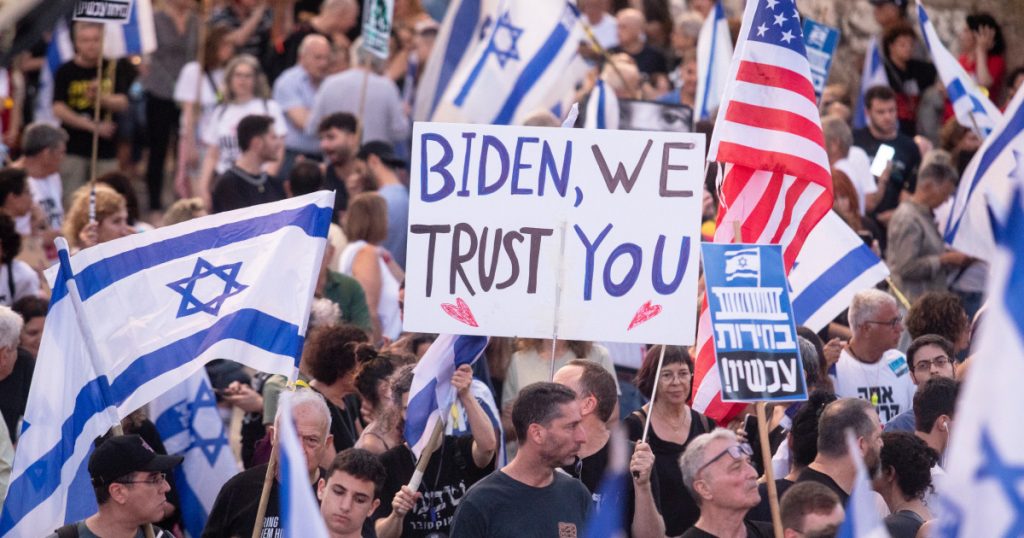An aide to Israeli Prime Minister Benjamin Netanyahu confirmed in an interview with Britain’s Sunday Times that Israel had agreed to the framework for President Joe Biden’s plan to end the war in Gaza, but described it as “not a good deal.” Biden announced on Friday that Israel had proposed a three-part plan that would eventually lead to a cease-fire in Gaza and the release of all hostages held there for the past eight months. Netanyahu initially appeared to dispute the plan, calling a permanent cease-fire in Gaza a “nonstarter” until specific conditions are met, including the destruction of Hamas’s military and governing capabilities and ensuring Gaza no longer poses a threat to Israel. However, Ophir Falk, Netanyahu’s chief foreign policy advisor, clarified that Israel was not rejecting the deal, emphasizing the importance of having all hostages released.
Israel’s official stance on Biden’s plan remains unclear, with NBC News attempting to get confirmation from the Israeli Prime Minister’s Office. Despite Netanyahu’s earlier comments, Falk emphasized in his interview that Israel had agreed to the deal, even though it was not considered ideal. The main focus for Israel was the release of all hostages and the destruction of Hamas as a terrorist organization. A demonstration in Israel on Saturday night called for the government to take action in response to Biden’s statement. The Hostages Families Forum, an Israeli organization advocating for the release of hostages taken during the Hamas attack on Oct. 7, urged members of Israel’s parliament to accept the deal, emphasizing the importance of bringing all hostages home for rehabilitation or burial.
The statement by Biden that Israel had proposed a plan for a cease-fire and the release of hostages came as a welcome development in the ongoing conflict in Gaza. The war has caused significant devastation and loss of life in the region, prompting calls for a peaceful resolution. The push to end the conflict and release hostages is seen as a step in the right direction towards achieving stability and peace in the region. The situation in Gaza has been a source of concern for many countries, and the agreement to work towards a cease-fire is a positive development that could lead to a resolution of the conflict.
The tensions in Gaza have been ongoing for months, leading to widespread suffering and loss of life. The conditions set by Israel for ending the war, including destroying Hamas’s military capabilities and ensuring Gaza no longer poses a threat, highlight the complexity of the situation. The focus on the release of hostages underscores the humanitarian aspect of the conflict, with families waiting for the return of their loved ones. The calls for action from the government and the push to accept the deal put forward by Biden indicate a shared desire for peace and an end to the violence in Gaza.
The conflicting statements from Netanyahu and his aide highlight the internal debate within Israel regarding the best path forward in resolving the conflict in Gaza. While Netanyahu initially appeared to reject the plan put forward by Biden, his chief foreign policy advisor clarified that Israel had agreed to the deal, albeit with reservations. The emphasis on the release of all hostages and the destruction of Hamas as a terrorist organization reflects Israel’s priorities in the negotiations. The demonstration in Israel calling for action and the advocacy from organizations such as the Hostages Families Forum further demonstrate the public’s desire for a resolution to the conflict and the safe return of hostages.
Overall, the situation in Gaza remains complex, with multiple stakeholders involved and differing perspectives on how to achieve a lasting peace. The agreement to work towards a cease-fire and the release of hostages is a positive development that could pave the way for further negotiations and a peaceful resolution to the conflict. The statements from Israeli officials and advocacy groups highlight the importance of humanitarian concerns in the midst of the conflict, underscoring the need for a comprehensive approach to addressing the root causes of the violence in Gaza. Ultimately, the willingness to engage in dialogue and find common ground is crucial in moving towards a resolution that benefits all parties involved and brings an end to the suffering in the region.


